Mindfulness-Based Stress Reduction (MBSR) Course
The Mindfulness-Based Stress Reduction course is making its debut in Kununurra, starting on October 23rd. Sessions will take place every week at the Kununurra Neighbourhood House, running from 5:30pm to 7:30pm, along with a full-day mini-retreat.
Cost is $300. Concessional options available – please contact our facilitator Michelle for more information.
Mindfulness Based Stress Reduction helps people better manage stress, pain, anxiety and chronic health conditions such as depression, as well as improve quality of life, self-compassion and feelings of wellness and contentment.
You will learn techniques include mindfulness meditation practices, gentle movements and healthy dialogues about ways to use mindfulness in daily life.
For more details please read below.
To register please follow this link or for more information, please contact
Michelle Chirgwin
on 0488 002 331 or email: michelle.chirgwin@boabhealth.com.au.

About MBSR
Mindfulness-Based Stress Reduction (MBSR) is a structured program that teaches mindfulness meditation to reduce stress, improve psychological well-being, and enhance overall quality of life. Originally developed by Dr. Jon Kabat-Zinn at the University of Massachusetts Medical School in 1979, MBSR has since gained worldwide recognition and is often used in medical settings, as well as in the general population, to help individuals manage stress, pain, and illness.
Core Components
- Mindfulness Meditation: The practice of intentionally focusing on the present moment in a non-judgmental way.
- Body Awareness: Also known as the “body scan,” this involves mentally scanning your body from head to toe, observing sensations without judgment.
- Breathing Exercises: Techniques to focus on the breath, which can help in calming the mind and reducing stress.
- Yoga: Gentle stretching and postures to enhance body awareness and relieve physical tension.
Structure
The MBSR program typically consists of:
- An 8-week course with weekly group meetings
- A one-day retreat usually between the 6th and 7th weeks
- Daily homework assignments that include various forms of mindfulness practice
- Guided audio meditations and written materials
Benefits
Research has shown that MBSR can be effective in improving:
- Mental Health: Reducing symptoms of anxiety, depression, and stress.
- Physical Health: Improving conditions like chronic pain, hypertension, and heart disease.
- Cognitive Function: Enhancing focus, memory, and decision-making skills.
Who Can Benefit?
MBSR is often recommended for people who:
- Are dealing with chronic pain or illness
- Are experiencing high levels of stress, either due to work, relationships, or other life circumstances
- Want to improve their overall psychological well-being
Limitations
While MBSR has been found to be beneficial for many people, it is not a substitute for medical treatment for serious psychological or medical conditions. Always consult healthcare professionals for a proper diagnosis and treatment plan.
Given its focus on holistic well-being and stress reduction, MBSR could potentially align with healthcare approaches that prioritize client-focused care and aim for overall health improvement.
